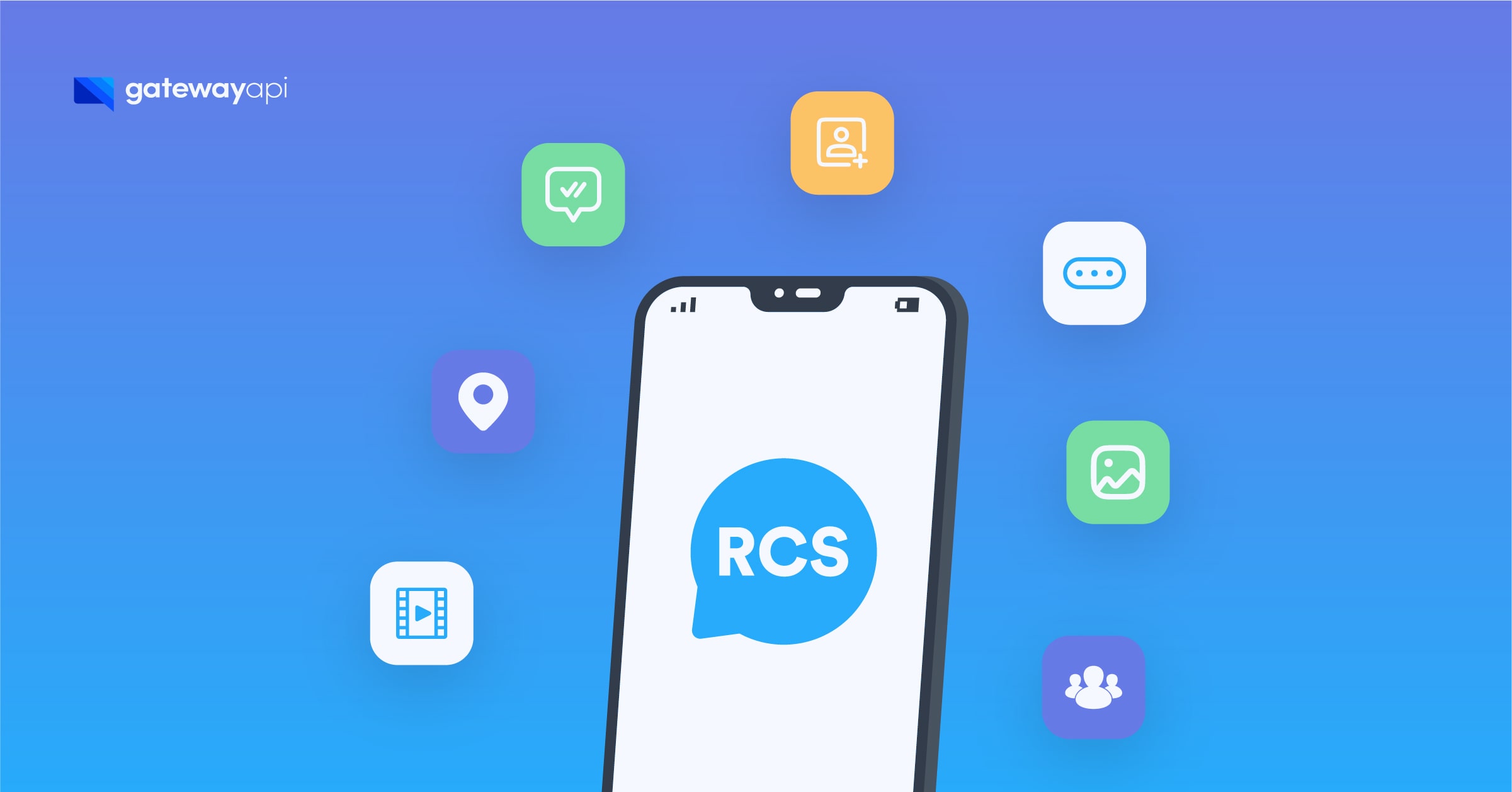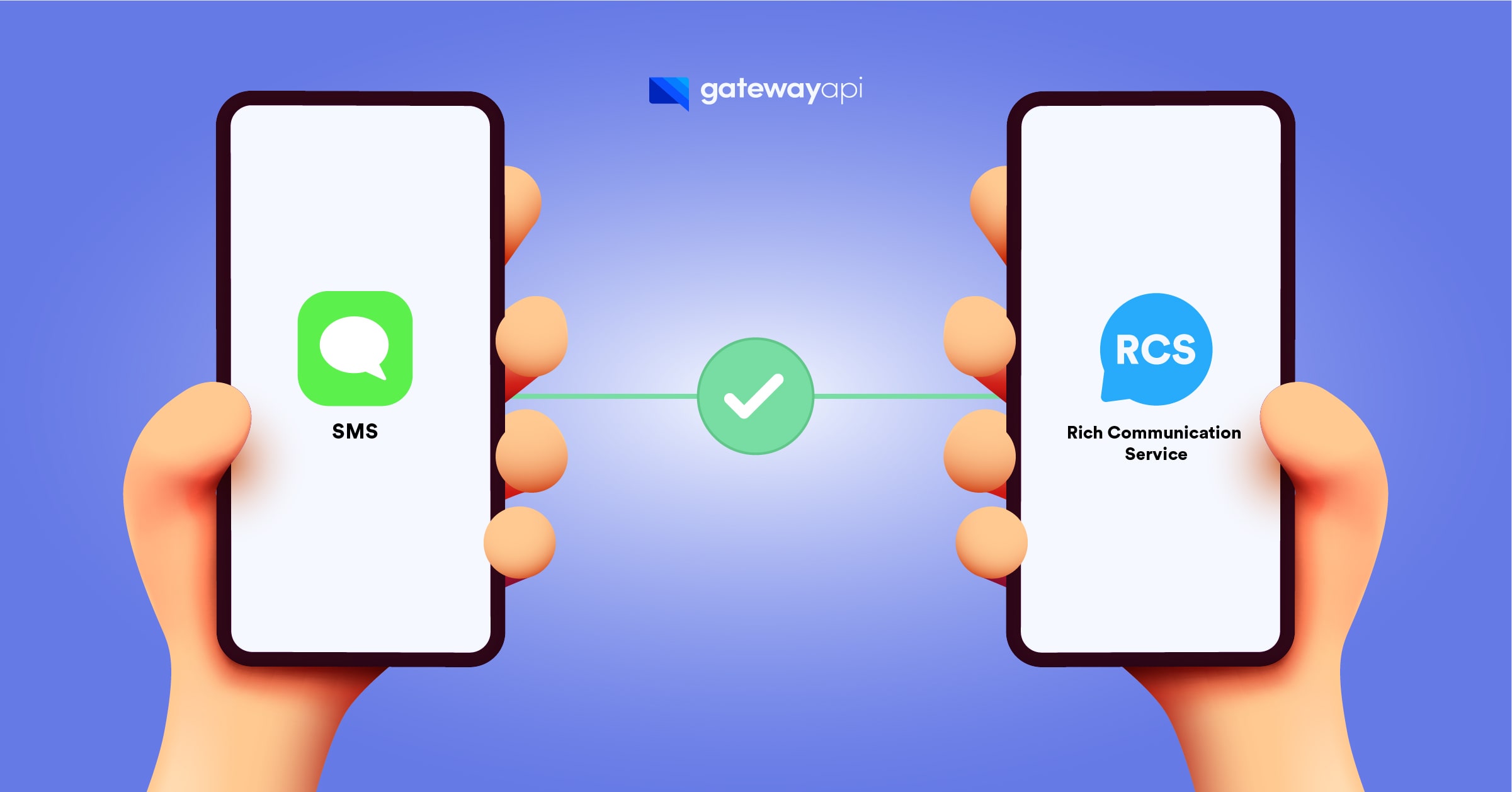RCS in 2024 and an insight into Apple's unexpected announcement

RCS has been in the works for many, many years, and 2024 looks to be the year when the technology finally makes its big breakthrough – at least in terms of P2P messaging.
We first wrote about the technology back in 2017, and you can actually trace its roots all the way back to 2008 when the GSM Association launched the protocol, which is a testament to how long and strenuous a struggle it has been to get everyone on board with the new standard.
In this blog post, we will discuss the many possibilities of RCS, the implications of Apple’s announcement regarding RCS and how we in the GatewayAPI team see the future of RCS and SMS technology.
Regardless of your current knowledge of RCS, we guarantee you will gain some new and useful insights!
What is RCS?
RCS is an acronym for Rich Communication Services and is a so-called multimodal technology, meaning it supports a variety of media types, including text, image, carousels, video, sound bites, group chats and more. In addition, it gives recipients more options to interact with RCS messages via buttons and suggested responses, and it gives senders more data to analyze, such as open rates and the number of users who have interacted with the messages. RCS is currently used by one billion users worldwide according to Google, which today mainly covers mobile phones that use Android as their operating system.
The technology is very similar to what OTT (Over The Top) messaging apps offer – the most common being Messenger and WhatsApp. RCS differs in that it is a communication protocol supported by telecom companies in the same way as SMS and MMS, whereas WhatsApp and Messenger are app-based. This means that it is the infrastructure of the telecom companies that is responsible for delivering the messages. This allows users to have an app/web-like experience without having to actually download an app.
RCS is thus also proclaimed to be the successor to SMS technology – an event we predict will not happen overnight, but instead will be a gradual transition where the SMS technology will still play an important role as a fall-back.
While RCS has the potential to improve the customer experience, SMS remains essential due to its universal applicability and reliability. Take an airline, for example: they can use RCS to send interactive boarding passes and travel updates to passengers. But in the event that the internet is down, an SMS with important information such as flight number and gate number can still be delivered. In this way, the two services complement each other by leveraging each other’s strengths.

Apple has announced that they will support RCS in 2024 – what does this mean for you?
It came as a big surprise to the entire messaging industry when Apple announced on November 16, 2023, that they will support RCS by 2024.
Here’s what Apple spokesperson Jacqueline Roy wrote verbatim:
“Later next year, we will be adding support for RCS Universal Profile, the standard as currently published by the GSM Association”
Until now, it has been a major challenge for the forces behind RCS that Apple has steadfastly refused to support the technology, given Apple’s market share of 20-25% in the EU and over 50% in the US. For RCS to work, both the sender’s and receiver’s devices and their mobile operators must support RCS.
Google and Samsung have long urged Apple to support RCS and have launched extensive campaigns on among other social media to promote this and have also put political pressure on Apple. Apple has long held back, citing security flaws in relation to encryption, but ultimately we can see that the pressure from Google and Samsung has come to fruition.
It’s worth noting that for iPhone users, iMessage will remain the default messaging app. RCS will serve as an alternative for communication with Android users. Another important aspect to note is that RCS still faces challenges with end-to-end encryption, especially when it comes to switching between RCS and iMessage. In addition, we don’t know for sure in which way Apple will choose to support RCS and whether there will be a difference compared to Android phones. RCS has so far not been uniformly implemented by telecom companies around the world, so there is a likelihood that it will be different.
It is also worth mentioning that Apple has not announced when they will support Rich Business Messaging (RBM), which covers the use of RCS by companies and organizations. Therefore, it is still a long way off before companies can seamlessly use RCS for mass communication.
All of this illustrates very well the challenges in the messaging industry, where large tech companies are looking to expand communication capabilities while ensuring user privacy and security at the same time.
RCS case examples: Increased value for customers
Below we have gathered a few case examples where well-known brands have been able to gain great value from RCS technology.
Virgin Trains: Service announcements
Virgin Trains, in partnership with Vodafone and an agency, launched an RCS communications program. The initiative involved sending RCS messages to customers 10 minutes before their arrival at London’s Euston Station with updates on tube trains with interactive capabilities.
The feedback was overwhelmingly positive, with all respondents giving the service five stars and none opting out. Virgin Trains emphasized the importance of SMS in their communication strategy, however, but they found RCS to be a valuable addition.
Barclays: Nudging and increase in interactive customer communication
Barclays implemented RCS to improve its mobile banking experience and offer customers a more interactive and engaging communication.
Barclays has many customers who still make payments by either calling the bank or visiting a branch, which Barclays wants to change by nudging people to use mobile banking instead.
To this end, RCS was used to guide the customer to use the Barclays mobile app. Barclays did this by starting with a message stating that they could see that the customer had made a payment manually and asking if the customer was aware that the app gave them the ability to easily do this themselves in the future. The customer could then click “See how”, which played an instructional video. Afterwards, there was also a button with a link that directed the user to where the app could be downloaded.
By introducing RCS, Barclays wanted to create a more interactive customer experience and set a new standard for customer communication in the financial industry – and, of course, nudge their customers to become better at self-service. It is Barclays’ expectation that they will see an increase in the number of interactions with their customers in the future with greater implementation of RCS, and that one day it will even be possible to make secure payments via RCS.
Stay tuned!
We are incredibly excited about RCS technology and the many possibilities it offers, which we predict will not only have a huge impact on what the service businesses can offer their customers, but also on the return on investment that marketing campaigns using RCS can provide. So far, we’ve seen examples of a threefold increase in engagement and a significant increase in ROAS, which of course doesn’t make the wait any easier.
Until then, we’ll just have to say: Stay tuned!

Global SMS Gateway
We have made it simple to implement SMS services into your business by offering some of the best prices worldwide as well as easy integration, world-class customer support, an intuitive interface and a rock-solid uptime of 99.99%. If you don’t have an account yet, you can create a FREE account in less than two minutes here: Go to GatewayAPI or contact sales@gatewayapi.com.
